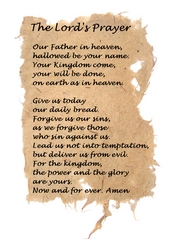Lesson Plan: Listening to the Lord's Prayer
Lesson Objectives: Materials Needed:
Process: 2. You might want to take time to create an interior spiritual atmosphere as well by inviting participants to take a few minutes of silence to let go of their worries, preoccupations, burdens and to become aware of the fact that they are in the presence of the Lord. A song or a piece of instrumental music can help here as well. 3. Read the Luke 11: 1-4. 4. Remind the participants that the Lord's Prayer is both a prayer and the Word of God. We should therefore not just say the words, but listen to them at the same time. 5. If you feel that the participants would benefit from an instruction on the meaning of the petitions in the Lord's Prayer by all means do so, but I suggest that the instruction and the meditation be in two separate sessions. You could, however, during the meditation session, before inviting the participants to meditate on the prayer, read a paraphrase such as the one written by Saint Francis of Assisi (see video below ) or one that you have created yourself. 6. Hand out the Listening to the Lord's Prayer sheets to each participant. 7. To counter a possible obstacle, explain the expression "what the Father might be saying to you" - this "saying" is most often in the form of thoughts, impressions, images, feelings, insights that form in one's mind, and very seldom in the form of direct language. 8. Invite the participants to take as much time as necessary and to not rush through the exercise. Give them a set time and tell them that if they only have time to meditate on a small segment of the prayer that is quite all right. I like to bring up the fact that some of the desert Fathers spent years meditating the Lord's Prayer, and that one of them (I forget his name) is said to have spent most of his life meditating on the two words "Our Father" and never managed to go any further! 9. Play some gentle unobstructive background music. If it is appropriate and feasible, let the participants find a quiet corner by themselves. 10. At the end of the set time, bring the participants back together. Explain to them that you will read each of the section of the Lord's Prayer in turn. Ask them to read what they have written down as they were meditating on that section of the prayer. Reassure them by letting them know that they need not do this if they are not comfortable doing so. They can read as many comments as they want or none at all. 11. End the session by praying the Lord's Prayer together standing in a circle and holding hands. Extension Pick up the reflection sheet. Read through them before the next session with the group. Pick out particularly insightful, beautiful, poetic, etc. expressions under each section of the Lord's Prayer. Write these down. At the beginning of the next session with the group, recite the Lord's Praye inserting the reflections you have gleaned from their sheets after each part of the prayer. Paraphrase of the Lord's Prayer by Saint Francis of Assisi
©Gilles Côté 2003 - Please feel free to copy and use this material for non-profit educational purposes. Please acknowledge your source if you do so. |
